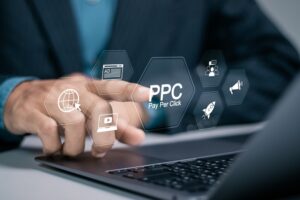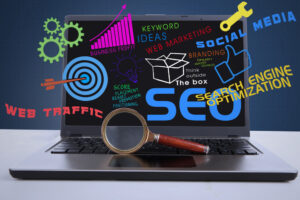In today’s digital world, businesses are moving their marketing efforts online. To stay competitive, it’s essential to understand the various tools and strategies available. Among these, SEM and PPC are two of the most commonly used methods. Both terms are often confused, but they actually refer to different approaches. This article will help clarify the difference between SEM and PPC in simple terms. By the end, you’ll understand how both can benefit your business.
What is SEM?
 SEM stands for Search Engine Marketing. It is an umbrella term that covers all strategies used to increase a website’s visibility on search engine results pages (SERPs). The goal of SEM is to drive traffic to your website by appearing prominently in search results. SEM involves both organic and paid efforts. Organic strategies include search engine optimization (SEO), which involves optimizing your website to rank higher in the unpaid results. However, SEM is mostly associated with paid advertising, where businesses pay to have their ads displayed on search engines like Google or Bing.
SEM stands for Search Engine Marketing. It is an umbrella term that covers all strategies used to increase a website’s visibility on search engine results pages (SERPs). The goal of SEM is to drive traffic to your website by appearing prominently in search results. SEM involves both organic and paid efforts. Organic strategies include search engine optimization (SEO), which involves optimizing your website to rank higher in the unpaid results. However, SEM is mostly associated with paid advertising, where businesses pay to have their ads displayed on search engines like Google or Bing.
The most important component of SEM is bidding on keywords. When someone searches for a term related to your business, your ad could appear at the top of the results, depending on how well you bid for that keyword. The more relevant and competitive your keyword, the better your chances of showing up.
What is PPC?

PPC stands for Pay-Per-Click. It’s a form of paid advertising where businesses pay each time someone clicks on their ad. PPC is often used interchangeably with SEM, but there’s a key difference: PPC refers only to the paid aspect of SEM. While SEM includes a broader range of techniques, PPC focuses strictly on paid advertising campaigns.
PPC ads are common on platforms like Google Ads, Facebook, and other social media platforms. When you run a PPC campaign, you bid on specific keywords, and if your ad wins the bid, it will be displayed to users. However, you only pay if someone clicks on your ad. This makes PPC a highly targeted form of advertising, as you’re only paying for actual engagement with your ad.
Key Differences Between SEM and PPC
While SEM and PPC are related, understanding the differences between the two can help you create a more effective digital marketing strategy.
1. Scope
SEM is a broad concept that includes both paid and organic strategies. PPC, on the other hand, is just one part of SEM. It focuses specifically on paid advertisements where you pay for each click.
2. Cost Structure
In SEM, the cost structure can vary depending on whether you’re focusing on organic or paid methods. SEO, the organic part of SEM, doesn’t require you to pay for clicks. It’s more of a long-term investment, where you work on optimizing your website to rank higher naturally. PPC, on the other hand, involves
immediate costs. Every time someone clicks on your ad, you pay a certain amount. The cost per click depends on how competitive the keyword is.
3. Long-Term vs Short-Term Results
SEO (a component of SEM) is known for its long-term benefits. Once your website ranks high, it can maintain that position without continuous payment. PPC, however, offers short-term results. Once your budget is exhausted, your ads will stop showing, and you’ll need to invest more to keep them running.
4. Traffic Generation
Both SEM and PPC are effective in generating traffic, but they do so in different ways. SEM uses a combination of organic ranking and paid ads to attract visitors. PPC is purely paid, driving traffic by bidding on keywords and paying for clicks. If you need fast results, PPC is the go-to option, as you can start getting traffic as soon as your campaign is live. SEM, on the other hand, can take longer, especially if you’re focusing on SEO.
5. Control Over Ads
PPC gives you more control over your ads. You can decide where your ads appear, which keywords they target, and even the times of day when they are shown. SEM, especially the organic side, offers less control because search engines determine where your website ranks based on algorithms.

Benefits of SEM
There are many benefits to using SEM as part of your digital marketing strategy:
Increased Visibility: By using both paid and organic strategies, you can increase your brand’s visibility on search engines.
Targeted Ads: SEM allows you to target users who are actively searching for keywords related to your business.
Improved Traffic: A strong SEM strategy can drive more traffic to your website by improving your ranking in search results.
Flexibility: You can adjust your SEM campaigns at any time, changing your keywords, bids, or ad copy to get the best results.
Benefits of PPC
PPC also has unique advantages that make it a popular choice for businesses:
Quick Results: With PPC, you can start seeing traffic and leads as soon as your ads are live.
Budget Control: You can set a daily budget, so you never spend more than you can afford.
Precise Targeting: PPC lets you target users based on their search behavior, location, device, and more.
Measurable Results: PPC platforms provide detailed analytics, so you can track how many clicks, impressions, and conversions your ads are generating.
Which Should You Use: SEM or PPC?
Choosing between SEM and PPC depends on your goals and budget. If you’re looking for fast results and have a budget to invest, PPC is a great choice. It allows you to get immediate traffic and measure the effectiveness of your ads. However, if you want to build a long-term online presence and are willing to wait for organic growth, SEM (including SEO) might be more suitable.
For many businesses, the best strategy is to combine both SEM and PPC. Using PPC can drive immediate traffic while you work on improving your SEO for long-term growth. This balanced approach allows you to benefit from both paid and organic traffic.
Conclusion
Both SEM and PPC are essential tools in today’s digital marketing landscape. While SEM is a broader concept that includes all efforts to increase search engine visibility, PPC is a specific type of paid advertising. Both can work together to help your business attract more visitors, improve brand visibility, and increase conversions. Whether you focus on SEM, PPC, or both, the right strategy can make a huge difference in your online success. Many businesses are now turning to Online Digital Services with Webex System in Pakistan to manage their SEM and PPC efforts effectively, ensuring they get the best results from their marketing campaigns.






